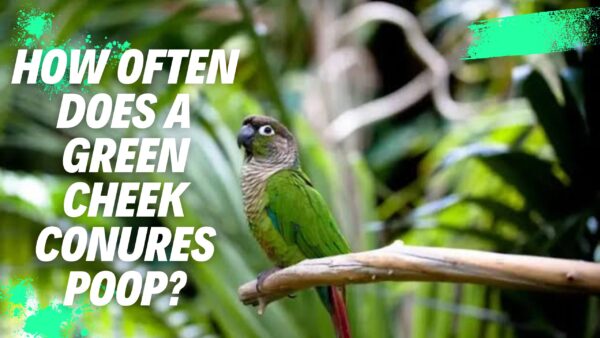How often does a green cheek conures poop?
How often does a green cheek conures poop? Green cheek defecates once every 15 to 20 minutes.
Because of this, it is not that your house will be filled with bird droppings. You will get options for keeping birds as well as keeping your house clean.

Contents
- 1 How often does a green cheek conures poop?
- 2 What should my green cheeked conure’s poop look like?
- 3 Do green cheeks smell like poop?
- 4 Does diet affect how often they poop?
- 5 Does their poop tell you anything about their health?
- 6 Can my bird poop make me sick?
- 7 Can you potty train a green cheeked conure?
- 8 Conclusion
What should my green cheeked conure’s poop look like?
A healthy green chick’s stool varies with their diet, Typically, a healthy bird’s faeces are greenish-brown in colour and tube-shaped with solid white products and a clear liquid component.
Its quantity depends on how much they have eaten and digested.
Stool colour may also vary, including red stool, blue or purple stool, and brown stool, and may also change with dietary changes.
For example, when a pineapple green cheek conure eats blueberries, they may pass blue or purple stools after a few minutes.
Do green cheeks smell like poop?
Luckily the answer is no.
Most bird poop has no smell!
There are two reasons why bird faeces do not smell.
First of all, the reason their stools don’t smell is that their diet generally consists of fruits, seeds, vegetables, and grains.
When these foods are broken down and digested in the intestines during digestion, they mostly do not create smelly waste.
Does diet affect how often they poop?
Yes!
Those who eat different types of food see changes in their stool, such as the quantity, consistency and frequency of their stool is affected.
The amount of food and water your bird consumes affects the number of faeces as well as its consistency.
The more water your bird drinks, the thinner their stool will become.
Eating red peppers and other coloured vegetables will also change the colour of the stool.
Does their poop tell you anything about their health?
Yes, If you are a bird owner, you must inspect the faeces made by your bird.
You can learn a lot about their health condition by looking at their stool and examining it perfectly.
Below are some pointers you should pay attention to to keep your bird healthy:
Diarrhea
If your bird’s food and water intake is unchanged and your bird is having diarrhoea, it may be a sign of stress, some infection, intestinal parasites, or kidney, liver, or pancreas disease.
Smelly poop
We already told you that bird faeces do not smell.
If bird poop has an odour, it means your bird has an infection like giardia or a digestive tract problem like steatorrhea (fat in the stool).
If this happens, take your bird to the nearest veterinary facility as soon as possible to evaluate the change in your bird’s stool.
Black stool
If your bird’s stool is black, it may indicate that there is bleeding somewhere in your bird’s GI tract.
Lime Green stool
This type of symptom indicates that specific infection called chlamydiosis or parrot fever.
Can my bird poop make me sick?
Yes, if dried particles of bird faeces are in the air and you inhale it, you can become sick.
There are three main diseases you can get from bird droppings.
The first disease they cause is psittacosis and it is spread by the bacteria Chlamydia psittaci (not to be confused with diseases caused by other Chlamydia species).
The second disease is Cryptococcus caused by the fungus Cryptococcus neoformans.
The third disease is histoplasmosis which is caused by the fungus Histoplasma capsulatum.
You can get this disease while cleaning bird droppings because bird droppings that dry up become light and powdery and easily dissolve in the air.
If you are cleaning your bird’s cage, you must wear a mask to prevent these particles from inhaling.
If you have symptoms of respiratory illness like cough, fever, or chills, you must tell the doctor at the time of your treatment that you have birds, so that they can understand your symptoms so that they can give appropriate treatment as soon as possible.
Symptoms of many respiratory diseases seem similar, so by giving this information, you will get proper treatment and the disease will come under control quickly.
Can you potty train a green cheeked conure?
Yes! It is absolutely possible for you to potty train your green-cheeked coney.
When you’re training your bird, you need to have a mop and a positive attitude.
Training your pet bird for housebreaking requires consistency, patience, commitment, and positive reinforcement.
The first step is to look at your green-cheeked conure’s poop, and you will have to do that frequently.
You have to learn the body language of your bird by observing its movements.
Most conures will have a consistent pattern of body language that some call a “potty dance.”
For example, your bird may be moving in a circle from a relatively stationary position or moving back and forth on a perch before leaving.
Some birds will walk backwards slightly or flap their wings.
In this way, you can know the body language of your bird.
Once you know your bird’s symptoms, you can take him to the potty station right away.
This station may be anywhere, but it depends on your bird’s ability to reach there and poop there.
For example, if your bird is not able to fly, you should place a potty station within walking distance of your bird.
Keep a positive attitude and remember that consistency and patience will result in it becoming easier in the future.
Can the poop frequency vary
Yes, factors such as diet, activity level, and stress level can affect the frequency of bowel movements of a green-cheeked conure.
Is frequent pooping normal for green cheek conures?
Yes, frequent defecation is normal behaviour for green-cheeked people and is part of their natural digestive process.
How do I manage to clean up my conure’s poop?
Regular spot cleaning and installing a suitable substrate or cage liner can help efficiently manage your conure’s faecal cleanup.
Conclusion
Green-cheeked conures are known for their frequent defecation habits, occurring every 15 to 30 minutes.
Although this behaviour may seem excessive, it is a natural and healthy part of their digestive process.
Bird owners can manage cleanliness by cleaning their cages regularly and providing proper cage substrate.
It is most important to monitor changes in stool frequency, colour or consistency daily to identify potential health problems early.
Understanding all this, understanding and accepting the regularity of the green-cheeked conure’s defecation behaviour makes the bird owner responsible towards the bird.
